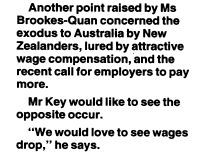Arrogance does nobody any good
... and that is why I am surprised at this important and blatant example:
Aspiring candidates for the job of New Zealand's top bureaucrat are being told by the National Party to think twice before applying.
Applications for the position of state services commissioner close on Monday and National's state services spokesman, Gerry Brownlee, is unhappy that his party will not be consulted as part of the appointment process.
A spokeswoman for State Services Minister David Parker told The Dominion Post that the National Party would be notified of the appointment, not consulted on it, before it was announced.
"They're not the government," Mr Parker said. "If we consulted the Nats, we should be consulting all the rest of the parties too. Where would it end?"
Do you imagine that a National Government in the same position would consult the opposition on the choice of leader of the State Sector?
Of course you don't, dear reader, because you are not stupid. The appointment of a State Services Commissioner by definition is a government responsibility, and because all parties believe in and uphold the political neutrality of the state sector, any party in government is going to appoint someone who is able to do the job for either party.
It is sheer arrogance of the most bare-faced sort to try and make partisan gain out of that, to imply that you know you're going to win the election, and that you should as an opposition party who the voters DID NOT TRUST with office, have some kind of dictat over what the elected government should do.
Extraordinary stuff, and a hint, another one of those rare but growing honest hints, of what National would be like were it to win the election later this year...

